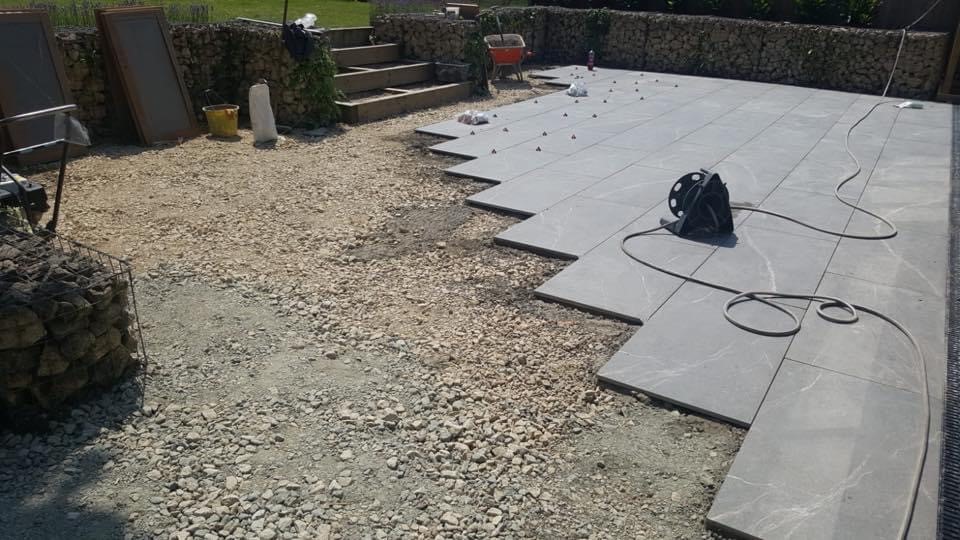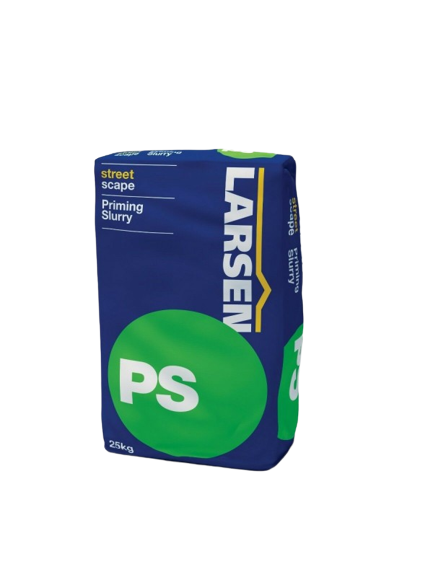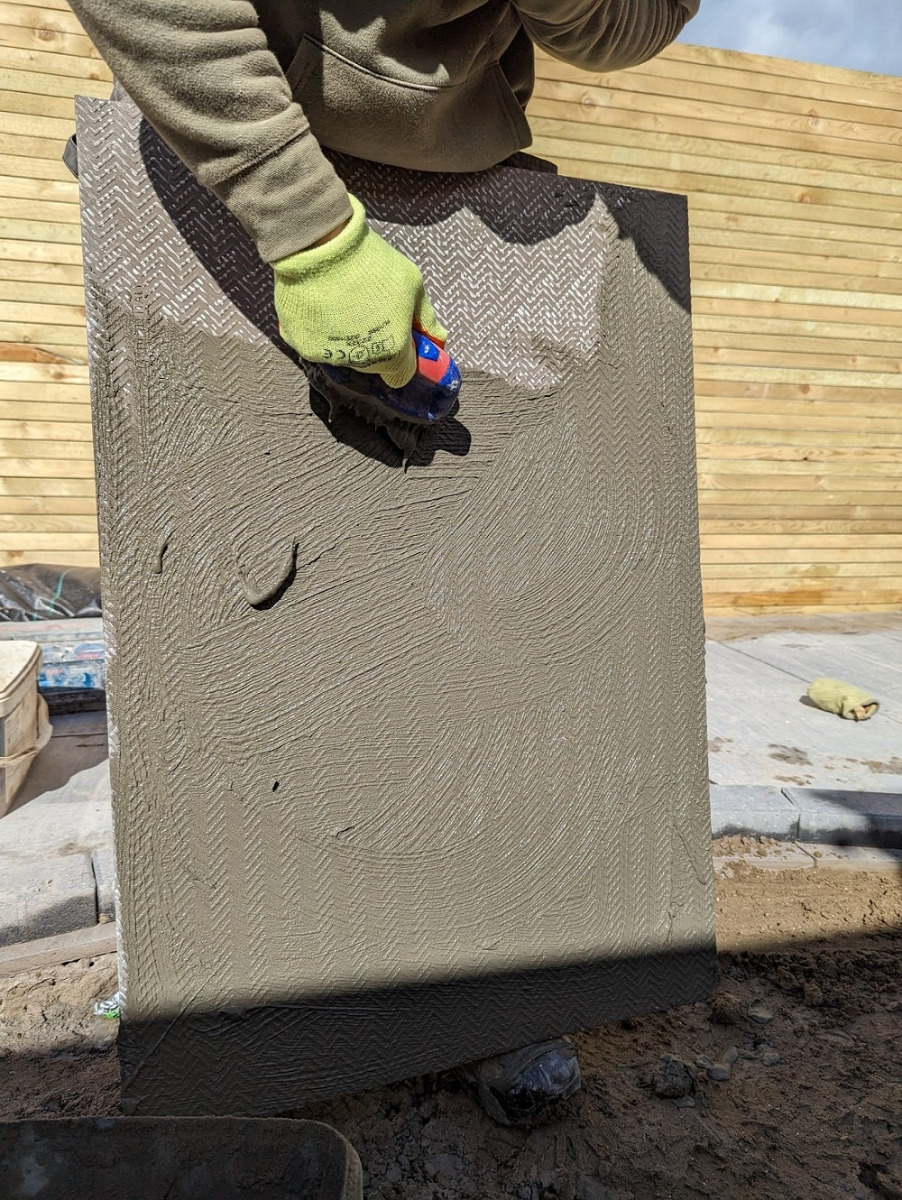What is Slurry Primer — Do You Need it?

Installing Porcelain Paving is a slightly different process to other paving styles due to some key characteristics.
What is Slurry Primer?
Slurry primer is a formulated mix that dramatically improves the bond between the mortar mix and the porcelain tile.
The sand and cement mortar mix on its own, was fine for traditional garden paving products such as sandstone, limestone and York stone.
However, as outdoor porcelain garden paving slabs are non porous you need to apply a slurry primer to the underside of the tile. This needs to be done wet slurry primer onto wet mortar bed, when the mortar mix dries it sucks to the slurry primer and the porcelain paving slab tile ensuring a fantastic bond- meaning no loose pavers!
Landscapers and homeowners do not want want to be asking the question of ‘How to fix loose paving slabs?’ So our advice at Melton Stone as the UK’s Number 1 Porcelain Paving supplier would always be ….apply a good quality slurry primer and improve the bridge bond between the mortar mix and the porcelain slabs.
Porcelain Paving is great at being stain-resistant, anti-slip and low maintenance meaning that it will look and stay clean, with care, for years. But compared to other popular paving styles, including Indian Sandstone, Porcelain has an exceptionally low level of water absorption, which means it will not draw moisture to the same level.
However, this means when laying the porcelain paving, it won’t absorb much from the bedding mortar naturally but, with the help of ‘Slurry Primer’, a strong bond is created between the mortar bed and tile to help it stay in place, not lift over time and maintain its structural integrity.

How to Use Slurry Primer?
Slurry Primer should be brushed onto the underside of each paving tile before it’s laid — priming paving tiles, including Porcelain Paving, requires minimal time and effort, and should not add an excessive cost to the installation process.
Slurry Primer is most commonly used for Porcelain Paving but can be used on other paving styles too including Natural Stone Paving, where it is often highly recommended by the manufacturer. When used on Natural Stone Paving, the risk of staining, known as ‘picture frame stains’, is significantly reduced whilst also reducing the risk of mortar patches being drawn up onto the face of the paving tile from the bed.
Mixing slurry primer is easy to mix, slurry primer comes in two separate types these are:
- Self Mix slurry primer
- Pre Mixed slurry primer
Self mix slurry primer is a dried powder that you simply add to a bucket or gorilla tub and mix with water, for best results landscapers, builders and property developers often use a drill whisk or paddle whisk to mix the slurry primer to a paste.
Pre mixed slurry primer is simply already mixed in a tub or bucket.
Slurry primer can be applied in multiple ways, but the most popular way to apply a slurry primer is either a trowel or brush.
The goal with the slurry primer is simply to cover the full underneath of of the outdoor porcelain paving tile or slab to then position on to the wet mortar mix ensuring a brilliant bond.
Can I make my own slurry primer for porcelain tiles?
We say no.
We have seen people trying to create their own slurry primer mix using SBR and a cement to create their own slurry primer bond, however the results will not be as good as a genuine product.
Melton Stone would not recommend using an SBR Cement self mix slurry primer as this does not how the formulated fibres that key the outdoor porcelain paving to the slurry primer on the underneath.

Why You Can’t Fix Porcelain Tiles into A Wet Bed
The traditional method of laying paving tiles, such as Natural Stone Paving, is using a wet mix sand and cement bed. However, this method isn’t suitable for Porcelain Paving, as it’s a non-porous material, the paving tiles will start to lift and won’t bond if placed directly onto the full mortar bed. By using a Slurry Primer, the tiles will adhere fully to the full mortar bed.
When installing outdoor porcelain paving slabs in your garden you must use a wet slurry primer mix, not a dry mix.
The slurry primer must be wet on wet, meaning it bonds with the mortar mix on the underneath of the porcelain tile.
The slurry primer must be spread across the full underside of the tile and a full mortar bed must be used when installing porcelain paving to ensure no voids are underneath the porcelain paving slab tile in your garden.
Landscapers have started using Slurry primer on both Indian sandstone aswell as porcelain paving now due to the benefits that you do not get loose pavers on your patio.
You do not need to fix loose pavers or loose porcelain tiles when you use a good quality slurry primer.
Melton Stone stock slurry primer in Hull, East Yorkshire at our showroom and we also deliver our slurry primer nationwide along with our Indian sandstone paving, 20mm outdoor porcelain paving and kitchen and bathroom tiles.
If you need advice or guidance using Porcelain Slurry Primer, don’t hesitate to get in touch and our experts will happily get back to you.

